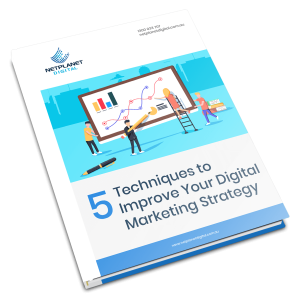Unless you are not living under a rock, just like every other digital agency in western Sydney, you must have heard about the buzzing AI-writing tool, ChatGPT.
Everyone is talking about the mighty open-ended tool and for a valid reason.
Let’s say a blog writer in an SEO agency in Campbelltown writes one 1000-word article in 3 hours. An AI tool like GPT, Jasper, or CopyAI can churn a heap of content at the same time. Realistically, it won’t take these AI writing tools more than 3 minutes to write the same article.
So clearly, AI tools win the race of churning out content quickly in large quantities.
And it’s adequately helpful — since content marketing is one of the most lucrative strategies. As per reports, 67% of marketers say that content marketing is effective at generating leads, and an independent 72% find it helpful to educate the audience. So you need large content output.
So does it mean you can completely rely on AI writing tools to generate content?
No, you absolutely cannot! Not entirely, at least.
Why? Let’s understand what the content marketing experts at Netplanet Digital, your local SEO company in Sydney, Australia, think –
Why Can’t an AI Writing Tool Be Your Go-To Content Pal?
Well, for starters, pushing out content in large quantities has a minuscule impact on the larger scheme of content and its ranking. The Internet is only getting more saturated by the day. So nobody is suggesting publishing one blog post, and three social media posts daily are crucial to attracting significant reach and numbers.
Moreover, Google has repeatedly established that its highest preference for ranking is quality content. Its E-A-T = Expertise, Authoritativeness, and Trust guidelines are stricter than ever. If it recognises low-quality content, it wastes no time to derank it.
When we gauge the AI writing tools from this perspective (quantity, quality, and Google’s stance), here’s what we found –
1. AI Content Is Not All Google Approved
In the early days of Internet and content marketing, marketers used to generate keyword-heavy, low-quality content with the help of writing bots. Google recognised this dirty play and launched its Panda update in 2011 to focus on quality content. Since then, search engines have had stringent measures in place to determine web page quality.
So while AI-generated content is not against Google’s guidelines (as long as you don’t use it to manipulate search rankings), the quality of the content will make its mark.
The problem is that most AI content is generic with little flavour and depth. If you are planning to churn out content and copy it as it is with no editing, it would lie on the low-quality bar.
2. AI Writing Has Errors
It’s fascinating to watch an AI writing tool create paragraph after paragraph in a few seconds out of thin air.
But AI tools do not generate fact-check content every time. A lot of times, its content is full of errors, wrong details, and even offensive and discriminatory answers.
The AI writing tools are not built for accuracy, not yet, at least. So the problem with using it with blinders on is you won’t know if the content is wrong unless you know the answer. As a result, you will be riding high on the risk of publishing inaccurate content for your target audience, losing their trust and your authority.
3. AI Content Can’t Replicate Human Emotions
AI writing and human writing have one critical unparalleled difference – the human touch – which the former can never fight.
Human writing has human emotions. It has style, flair, empathy, emotion, colour, and life. The content piggybacks on the writer’s experiences, expertise, writing style, and perspectives.
On the other hand, AI content is generic, repetitive, dull, and robotic. It won’t have the same flow, sentence variety, or engaging language. Moreover, it will lack the depth and empathy of a human — which makes a world of difference.
Even if your AI content gets the green light from search engines, you can’t fool your audience. They will see right through the artificialness of your subject, abandoning it for a content piece written by an expert with practical insights and an empathetic voice.
Closing Remarks
Most businesses and marketers find AI writing tools tempting because they can produce huge amounts of content in minutes. To add to it, they generate coherent content, so one will feel comfortable copying it with little to no editing.
However, if you wish to put out high-quality, Google, and user-approved content that can fuel your content marketing efforts, you have to intervene. You need to edit the content logically and add the element of human writing to make it competitive.
Relying solely on AI writing tools with your eyes closed simply means you’re playing with fire and will probably end up hurting your existing content marketing strategy.
Instead, use these tools as they are – an occasional helping hand to get out of your writer’s rut or generate some out-of-the-box content ideas.
If you’re struggling with content creation in this content-saturated market, our digital agency in western Sydney can help. At Netplanet Digital, a professional website builder company and web agency, we help you create streamlined content strategies to skyrocket your content marketing results.
Book a 30-minute strategy call with our SEO and content marketing specialists today.
























































